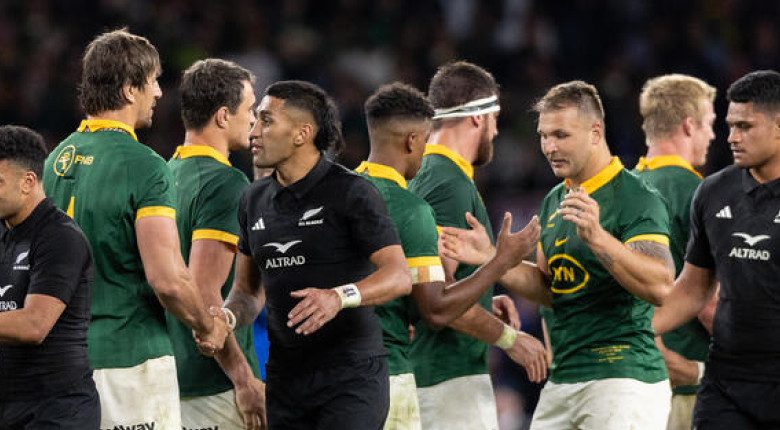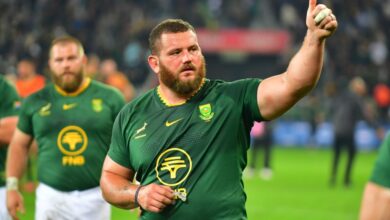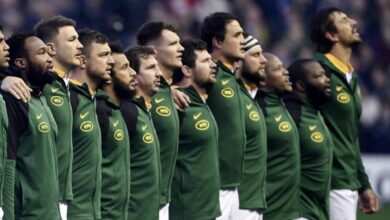The ‘massive challenge’ separating Springboks and All Blacks transitions

It’s a season of transition for the global rugby south, with all four Rugby Championship nations entering the annual competition with new coaching groups.
Michael Cheika has stepped away from Argentina, Ian Foster has been replaced in New Zealand, Eddie Jones was cast aside in Australia and Jacques Nienaber has moved on from South Africa.
While it’s the Kiwis looking to defend their TRC crown once more, it’s again the South Africans who enter the competition as reigning world champions.
It’s also the Springboks facing the biggest on-field transition. The core group who have brought the nation two World Cup wins since 2019 are too old to make another run in 2027, meaning the team must unearth a new generation of world-beaters during this World Cup cycle.
It’s something that was highlighted by Simon Strachan of Gainline Analytics, someone who studies and specialises in cohesion analytics.
“The interesting thing about South Africa, they’ve had this advantage of having this core group together for such a long period of time because they brought them together at the same time,” Strachan told the Aotearoa Rugby Pod.
“Now, they’re going to have this situation where they’re going to have to transition that group in a big chunk and that is a massive challenge for them. How they transition that group towards 2027.
“I think it’s been acknowledged, even Rassie acknowledged it, they aimed for 2023 and the 2019 World Cup was almost a bonus for them. They were absolutely competitive then but they won it.
“But how they transition into 2027 is really critical for them.”
Strachan dived into some more detail on the All Blacks transition under Scott Robertson, highlighting the importance of pacing out the transition period.
“It’s a case of let’s transition into what we want to do without making a massive amount of shift. Because, if you change the way you’re playing and you change the players, it’s going to be chaos. You don’t know necessarily what’s not working, and so I think there is a transition of the way they play, the All Blacks, and there’s going to be a transition of players at the moment.
“It’s going to be a bit scratchy and it has been a bit scratchy to start with, but you’re always going to expect that. It’s a case of understanding what you have and making decisions around that going forward. Part of that is at what time are you going to make that transition?”
READ MORE :
The contentious late attempt by Fiji to end the Olympic dream prompts the Irish Sevens leader to propose a “clean up” of the TMO process.
There was controversy in that Fiji’s crucial winning try was scored off a knock-on from a re-start that wasn’t seen by the referee, and the TMO wasn’t able to intervene.
James Topping believes the Olympic quarter-final near-miss against reigning champs Fiji must be a tipping point for the Men’s Sevens game in Ireland.
It was a tough ask for the men in green to topple the unbeaten Rio and Tokyo gold medal winners in the last eight at the Stade de France, after losing their final Pool A game to top seeds New Zealand yesterday afternoon.
A first minute try concession didn’t bode well but, inspired by a brace of tries by Chay Mullins, Ireland were good value for a 15-7 lead in the closing stages.
However the quick-fire concession of a brace of tries- saw them left to fight for the minor places on Saturday.
There was controversy in that Fiji’s crucial winning try was scored off a knock-on from a re-start that wasn’t seen by the referee, and the TMO wasn’t able to intervene.
“I didn’t see it, I’m at the side of the pitch and even the angle of the replay doesn’t show it,” admitted Topping later.
“We would have lost games this year if they were to look back and there were knock-ons.
“The decision is made but maybe it’s something to look at down the line if they can clean those things up. We should have caught that kick-off is what we would say, probably.”
Mullins said: ““It’s the ref’s decision at the end of the day. We had a view on the pitch that it was a knock-on but the ref thought otherwise so that’s the game, really.
“Massively disappointing. They’re the only two words I can really think of. Speechless. We obviously wanted to make it through the quarter-final and we felt like we were there, that we had them, and for the majority of the game we were the better team. Again, just decision-making and just slight drop offs (cost us).”
And skipper Harry McNulty added: “I just told the players I don’t think there’s any better team that I’ve played with than this group of guys, we have the capabilities of playing the best in the world. It’s our mistakes that mean we are getting beaten by these teams, it’s more us losing it.”
Such was the case in the loss to New Zealand, when Ireland again had the better of the exchanges but failed to land a killer blow.
Topping, Ireland’s head coach, was proud of the fact that his team had been so close in both games. “To be honest, we probably made three or four mistakes in that game and that’s three or four scores and the games,” he said.
“It’s disappointing. We were ahead by a score but you can’t just bank on that there and try to just park the bus and expect them not to come back at you.”
Earlier, hosts France had rocked the Stade by seeing off the Kiwis in their last eight encounter. It was a reminder that there is so little between these sides, and Ireland had been very consistent in the Sevens series in the season just gone, finishing in second place without actually winning a final along the way.
For Topping, however, exiting before the medal matches in Paris is an indication that a reset is needed in terms of approach and personnel. “It’s skills and looking at our skillset, who we want playing the game,” he said.
“The game’s changed, you’ve seen a bit with the likes of Zac Ward who’s just been a fantastic player for us all year. It’s maybe that robustness and size we need coming through more.
The way the game is played now, it’s gone professional in the last two or three years, the size of the players and their skillset has increased so much.
“It’s going to have to be an effort where we work a lot harder, hunt a lot higher, maybe be a bit more demanding of players around Ireland, try to get them more invested in it a bit more because you can see the intensity and how a hard game it is to play.”



